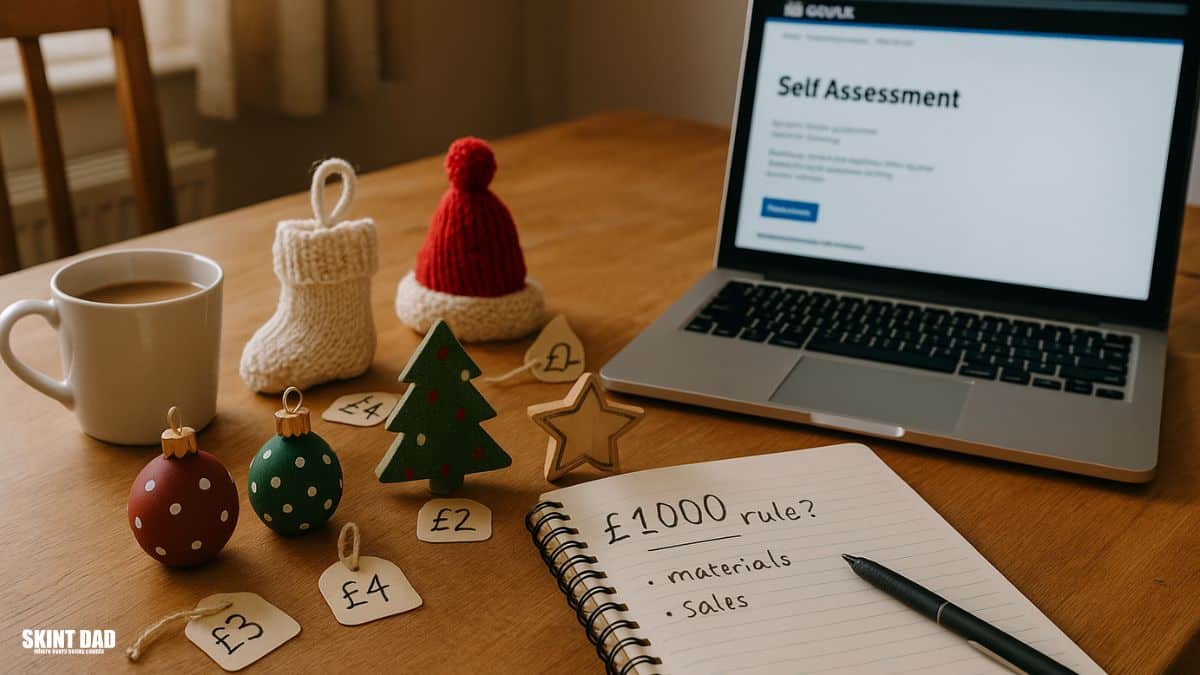Many people use the run-up to Christmas to bring in a bit of extra cash. Handmade decorations, knitted gifts, wooden toys, upcycled furniture and busy market stalls pop up everywhere.
It’s a great way to boost your budget, especially when money feels tight.

But when does a simple side hustle turn into something you need to tell HMRC about?
Get a free £10 bonus with Swagbucks
Earn a bit of extra money in your spare time with surveys, videos, and simple tasks you can do at home.
New users can get a £10 bonus when they sign up.
Get the £10 bonus
The rules can feel confusing, so here’s a clear, friendly guide to help you avoid any trouble later.
The £1,000 rule explained
There is a special allowance called the trading allowance. This lets you earn up to £1,000 a year from selling goods or services without telling HMRC.
If your total earnings from all side hustles stay under £1,000 in a tax year, you usually don’t need to do anything.
This can include things like selling crafts, doing small services or even creating digital content.
But as soon as you go over £1,000, you must register as a sole trader and complete a Self Assessment tax return.
A key point is that the allowance covers everything you earn from all your side hustles combined, not just one.
So if you make £600 from Christmas craft sales and £500 from selling digital prints, that takes you over the limit.
What counts as taxable trading
Selling your old belongings (like second-hand clothes or toys) usually doesn’t count as trading. You’re just clearing space and getting some money back.
But making things to sell for profit does count as trading. Christmas markets, handmade crafts, printed cards, upcycled items and seasonal food stalls are seen as business activity.
A quick way to think about it is this: if you’re creating, making or buying items mainly to sell for profit, you’re trading.
How to register if you go over £1,000
If your craft or festive sales take you past the limit, you’ll need to:
- Register for Self Assessment as a sole trader
- File a Self Assessment return online
- Pay any tax and National Insurance due
For the 2024 to 2025 tax year, the deadline to file and pay is 31 January 2026.
HMRC has a simple online tool that can help you check whether you need to report anything. It takes a couple of minutes and tells you what to do next.
Why the rules are being highlighted this Christmas
HMRC has seen lots more people taking on small seasonal side hustles. Many don’t realise they need to report their income, especially when earning a little feels harmless.
There’s also a new rule where online platforms must share data with HMRC if sellers have 30 or more sales and make over around £1,700 a year.
It doesn’t mean you’ll be taxed straight away, but it does help HMRC spot who should be registered.
The message is simple: earn what you can, enjoy the extra boost at Christmas, but stay inside the rules so you don’t get surprised with a bill later.
Quick tips for Christmas crafters
- Keep a note of everything you sell and the money you make
- Track your material costs so you know your profit
- Use the HMRC checker tool if you’re unsure
- Register early if you plan to earn more than £1,000 this year
- Keep your records safe for future tax returns

Skint Dad says:
Making and selling Christmas crafts is a brilliant way to earn extra money. Just stay organised and know where you stand with tax so that every pound you make actually helps your household.
Where to get help
You can find straightforward guidance on the Help for Hustles page on GOV.UK. There are guides for people who sell items, offer services, or create online content.
There’s also support if you need help filling in a Self Assessment return or paying a tax bill.
Christmas side hustles can make a real difference to your budget. Knowing the rules keeps things stress-free, so you can focus on earning a bit more and enjoying the season.
Saved a few quid with our tips?
If Skint Dad has helped you spend less or feel more in control of your money, you can support the site with a small contribution.
- Side hustles and benefits in the UK: what you need to know - 8 January 2026
- Lloyds Bank switch deal: grab £250 plus Disney Plus for free - 6 January 2026
- Thinking of doing the Co-op freezer deal? Read this first - 6 January 2026
